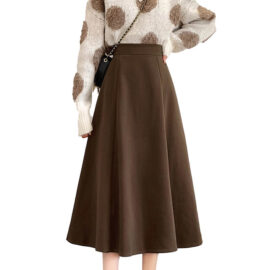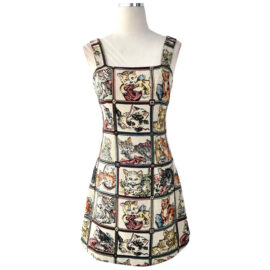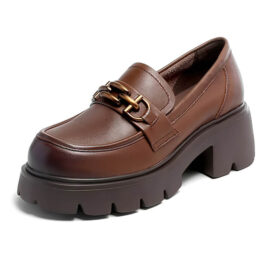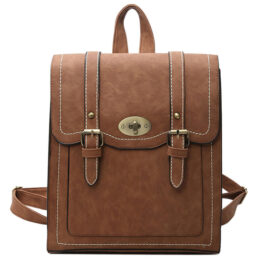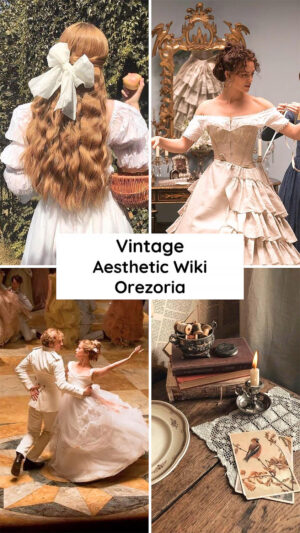
The vintage aesthetic is a popular trend that embraces the style and fashion of eras past. It draws inspiration from fashion trends from 20 or more years ago and celebrates the nostalgia associated with these bygone eras. The vintage aesthetic is not just limited to fashion but extends to all aspects of life including accessories, design, and even home decor.
With its roots in the fashion industry, the vintage aesthetic incorporates elements such as bright colors, bold patterns, and unique cuts that were popular in the past. It often involves the use of statement accessories, floral patterns, plaid skirts, and even mom jeans or skinny jeans. It is an umbrella term that covers various styles and influences from different decades, such as the bohemian and hippie fashion of the 70s or the 90s grunge style.
The vintage aesthetic appeals to those who appreciate the sense of freedom and individuality it brings. It allows people to express their personal style while paying homage to the fashion of the past. There is a certain charm and timeless appeal in vintage pieces that cannot be replicated by modern recreation. Moreover, the vintage aesthetic also aligns with the growing interest in sustainability and the desire to embrace clothes and items with a history and story behind them.
Related aesthetics: 60s, 70s, 80s, Avant Basic, Balletcore, Boho, Bookstore Girl, Coastal Grandmother, Cottagecore, Dark Academia, Ethereal, Fairycore, Goblincore, Grandmacore, Indie, Light Academia, Old Money, Retro, Royalcore, Vampire, Witchy Academia
Full List of Aesthetics
Historical Context of the Vintage Aesthetic
The vintage aesthetic is deeply rooted in the historical context of fashion. From the 1920s to the present day, fashion trends have evolved and shifted, with each era leaving its own unique mark on the style landscape.
The early 20th century saw the rise of several fashion movements that continue to influence the vintage aesthetic today. The flapper style of the 1920s embraced shorter hemlines, loose silhouettes, and bold accessories, while the 1950s embraced a more feminine and glamorous look with hourglass silhouettes, full skirts, and cinched waistlines. The 1960s brought about the mod fashion movement, characterized by bold and geometric patterns, mini skirts, and go-go boots.
Throughout the decades, subcultures have also played a significant role in shaping the vintage aesthetic. The bohemian and hippie fashion of the 1960s and 1970s embraced a free-spirited and non-conformist approach with flowing maxi dresses, fringe, and psychedelic prints. The punk and grunge scenes of the 1970s and 1990s, respectively, added a rebellious edge with torn denim, band merchandise, and leather jackets.
Economic factors and popular culture have also played a significant role in the rise and popularity of vintage styles. Economic downturns have led people to seek out affordable and unique clothing options, often turning to second-hand stores and vintage shops. Additionally, popular culture icons like Audrey Hepburn, Marilyn Monroe, and Madonna have influenced fashion trends and inspired people to embrace vintage style.
What Does Vintage Mean?
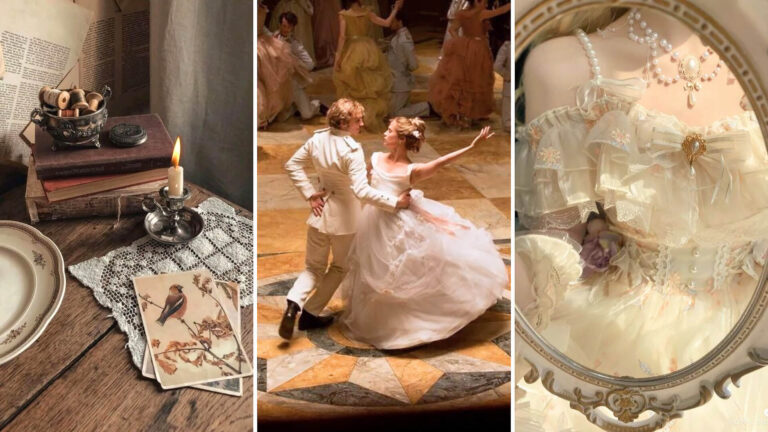
In the context of aesthetic style, vintage refers to clothing and fashion movements from 20 or more years ago. It is a term widely used to describe a nostalgic nod to the past, evoking a sense of romanticism and appreciation for earlier eras. Vintage pieces are often associated with quality craftsmanship and unique styles that stand the test of time.
It is important to note that vintage and antique are different. Vintage refers to items from the 20th century, while antique pieces are typically considered items from before this time.
The vintage aesthetic style encompasses a wide range of clothing styles and fashion movements from different decades. It includes clothing, accessories, footwear, headwear, and bags that reflect the trends and vibes of past eras. From flapper-inspired dresses with intricate beadwork from the roaring 1920s to mod-printed mini skirts and go-go boots of the swinging 1960s, vintage style allows for personal expression and a connection to the fashion history that influenced today’s trends.
Types of Vintage Sub Styles and Related Aesthetics
When it comes to the world of vintage fashion, there are a multitude of sub-styles and related aesthetics to explore. Each one offers a unique glimpse into a specific era and allows individuals to embrace their personal style. From the bold and daring vibes of the 70s aesthetic to the timeless elegance of retro style, vintage sub-styles cater to a wide range of preferences. Let’s overview some of them:
Cottagecore
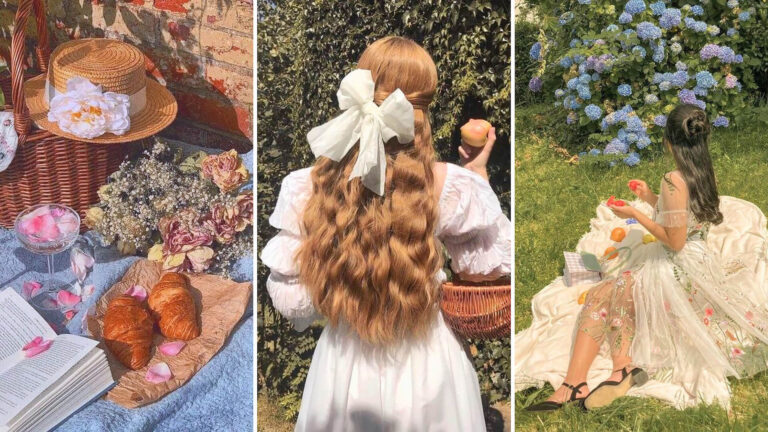
Cottagecore is a fashion subculture that has gained popularity in recent years. Rooted in a romanticized countryside lifestyle, it embraces a slower pace of life and a deep appreciation for nature. Cottagecore fashion offers a whimsical and nostalgic aesthetic that transports individuals to a simpler time.
The key elements of cottagecore fashion revolve around loose and comfortable clothing in soft fabrics and earthy tones. Dresses and skirts are often worn in flowy silhouettes, allowing for ease of movement and a carefree vibe. Floral prints, ruffles, lace, and vintage-inspired designs are also prominent features, adding to the dreamy and nostalgic feel. The overall look is effortlessly feminine and ethereal.
In addition to clothing, accessories play a crucial role in completing the cottagecore aesthetic. Handmade jewelry, such as delicate necklaces and dainty bracelets, add a personal touch and enhance the rustic charm. Straw hats and woven shoulder bags further evoke a bucolic vibe, reminiscent of picnics in fields of wildflowers and strolls through meadows.
Cottagecore fashion celebrates simplicity and a connection to nature. It invites individuals to embrace a slower and more mindful way of life, even in the midst of a bustling modern world. With its rustic and dreamy aesthetic, cottagecore offers an escape to a serene countryside haven.
Light Academia
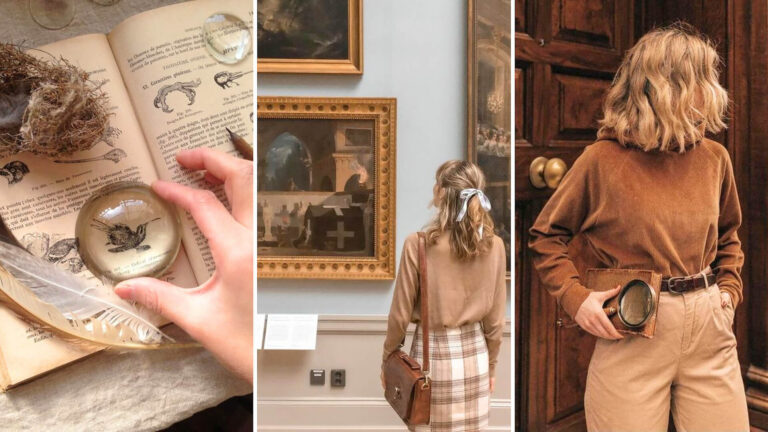
The Light Academia aesthetic draws inspiration from the intellectual and scholarly atmosphere of prestigious institutions like Oxford and Cambridge. It combines vintage-inspired pieces with modern, intellectual items to create a stylish and scholarly look.
The origins of Light Academia can be traced back to the rise of the academia aesthetic on social media platforms. This aesthetic is characterized by its focus on education, literature, and refined taste. Light Academia builds upon this foundation by incorporating vintage elements and a softer color palette.
Soft, muted colors like beige, cream, and dusty pink dominate the Light Academia aesthetic. These colors create a serene and dreamy atmosphere reminiscent of old libraries and cozy study spaces. Classic wardrobe staples like pleated skirts, Oxford shoes, and wool blazers are also frequently seen in Light Academia outfits. These pieces embody a sense of sophistication and intellectualism.
The combination of vintage-inspired pieces and modern, intellectual items in the Light Academia aesthetic creates a distinct look that is both timeless and fashionable. It captures a sense of nostalgia for the past while still embracing the present, making it a popular choice among those who appreciate both classic elegance and contemporary style.
Dark Academia
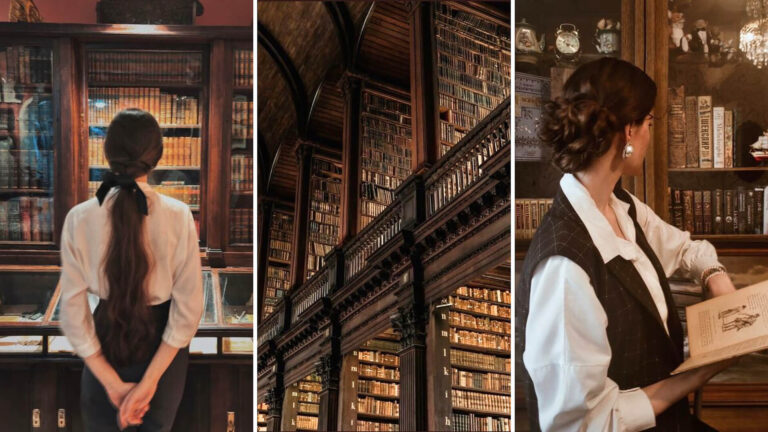
Dark Academia is a style that emerged on social media platforms as an intellectual and moody aesthetic. It is the antithesis to its lighter counterpart, Light Academia, and is characterized by its darker color palette and focus on classic wardrobe staples.
Unlike Light Academia’s soft and muted colors, Dark Academia embraces a darker and more somber color scheme. Shades of black, navy, burgundy, and deep green dominate this aesthetic, creating a mysterious and intellectual ambiance. The style draws inspiration from university settings, libraries, and old-world charm.
Classic wardrobe staples play a significant role in achieving the Dark Academia look. Think tailored blazers, turtlenecks, pleated skirts, high-waisted trousers, and leather accessories like satchel bags and brogues. These timeless pieces evoke a sense of nostalgia and intellectualism.
To achieve the Dark Academia aesthetic, incorporate key elements like layering, mixing textures, and accessorizing with vintage-inspired jewelry. Experiment with dark, dramatic makeup looks, such as a bold lip or smoky eyes, to enhance the mysterious allure.
Victorian Goth
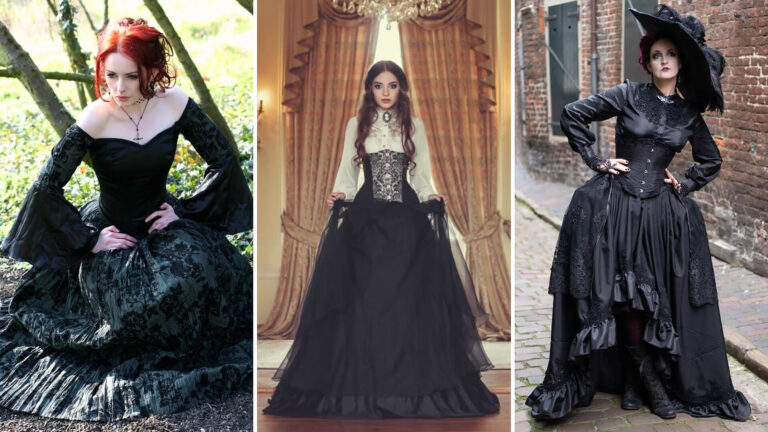
Victorian Goth is a unique substyle that combines the elegance and opulence of Victorian era fashion with the dark and macabre aesthetics of the gothic subculture. This substyle draws its inspiration from the Victorian period, known for its elaborate and detailed clothing.
Characterized by its rich fabrics, intricate lacework, and corsets, Victorian era fashion sets the foundation for the Victorian Goth look. The style incorporates elements such as high collars, puffed sleeves, long skirts, and bustles, creating a romantic and dramatic silhouette.
However, what sets Victorian Goth apart is its infusion of dark and macabre elements. This substyle embraces the romanticization of death and decay, with motifs like skulls, spiders, bats, and cobwebs often incorporated into accessories and jewelry. Black is the predominant color, symbolizing mourning and melancholy.
Influenced by the gothic subculture, Victorian Goth takes inspiration from literature, art, and music associated with gothic themes. It combines the Victorian fascination with death and the supernatural with the gothic subculture’s love for expression through fashion.
Royalcore
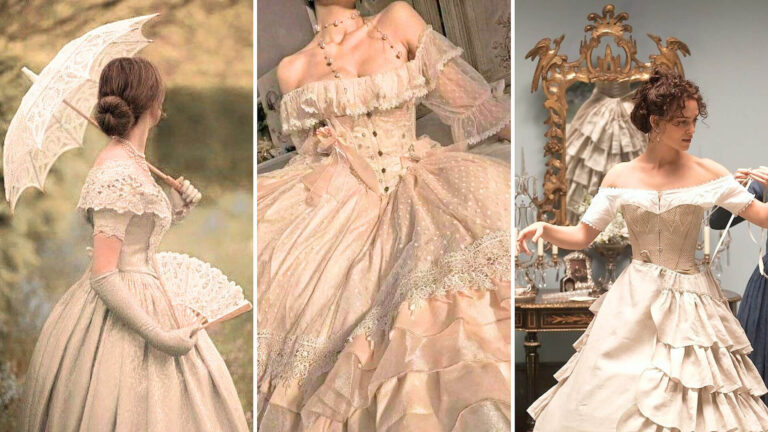
Royalcore is a captivating sub-style of the vintage aesthetic that draws inspiration from the opulence and grandeur of royal fashion and aristocratic lifestyles. It takes cues from centuries past, reimagining the elegance and sophistication of royal courts into a modern-day aesthetic.
Key elements of Royalcore include the use of opulent fabrics such as velvet, silk, and brocade, which offer a luxurious touch to outfits. Regal colors like rich jewel tones and deep hues create a sense of nobility and grandeur. Intricate details play a significant role in this aesthetic, with embellishments like lace, beading, and embroidery adorning clothing and accessories.
In embracing the Royalcore aesthetic, individuals are transported to a time of lavishness and refinement, evoking a sense of grace and poise. By incorporating vintage fashion and aristocratic style, Royalcore enthusiasts create unique and timeless looks that exude regal charm.
Retro (60s, 70s, 80s)
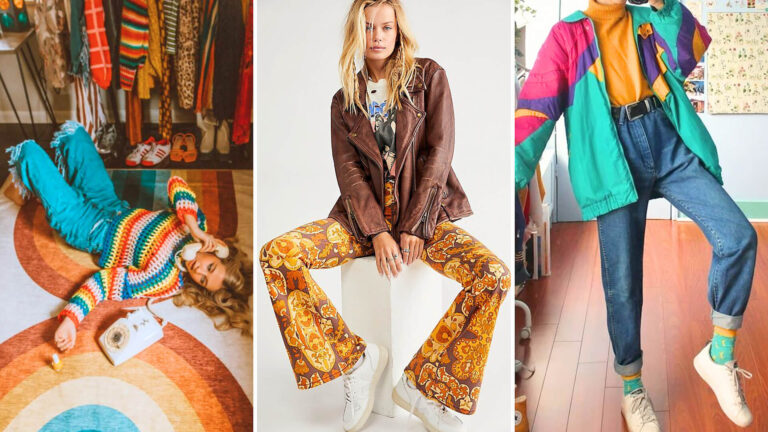
The Retro aesthetic is a broad umbrella term that encompasses various substyles, each representing a different era of fashion. In particular, the 60s, 70s, and 80s were pivotal decades that left a significant impact on fashion trends.
The fashion trends of the 60s were characterized by bold and vibrant colors, geometric patterns, and mini skirts. This era saw the rise of mod fashion, with its clean lines and futuristic silhouettes. Key clothing items included shift dresses, go-go boots, and statement accessories like oversized sunglasses and pillbox hats.
The 70s introduced a more bohemian and free-spirited vibe to fashion. Earthy tones, floral patterns, and flowing maxi dresses became popular. Bell-bottom pants and peasant blouses were staple pieces, while platform shoes and floppy hats completed the look. This era was all about embracing natural and effortless style.
In the 80s, fashion took a bold and eclectic turn. Bright colors, bold prints, and oversized silhouettes defined the era. Shoulder pads, acid-washed denim, and neon accessories were all the rage. This decade was known for its daring and experimental fashion choices.
Overall, the Retro aesthetic exudes a nostalgic and vintage vibe, taking inspiration from past eras. Whether it’s the mod glamour of the 60s, the bohemian chic of the 70s, or the flashy boldness of the 80s, Retro fashion allows individuals to express their personal style in a unique and timeless way.
The Difference Between Vintage and Retro
The terms vintage and retro are often used interchangeably in the fashion world, but they actually represent different aesthetics that evoke nostalgia in unique ways.
Vintage refers to clothing styles from 1920 or more years ago, allowing us to revisit the fashion trends of the past. It is an umbrella term encompassing various decades, such as the 70s and 80s. Retro, on the other hand, refers to clothing that imitates more recent trends, often drawing inspiration from the 90s or early 2000s.
Vintage aesthetics are characterized by their nostalgic appeal. Each era brings its own distinctive style, from the clean lines and mod silhouettes of the 60s to the bohemian and free-spirited fashion of the 70s. Vintage fashion allows individuals to embrace a sense of individualism by choosing unique, one-of-a-kind pieces that reflect their personal style.
Retro aesthetics, on the other hand, recreate a specific period’s fashion in a more modern context. It is a celebration of recent trends, offering a fun and playful take on fashion. Retro fashion often includes bold colors, statement accessories, and trendy silhouettes.
In summary, vintage and retro aesthetics both embrace a sense of nostalgia, but vintage refers to clothing styles from decades past, while retro imitates more recent trends. Vintage fashion offers a unique and individualistic approach to personal style, allowing individuals to embrace the beauty of the past.
Vintage Aesthetic Fashion and Outfits Guide
Vintage aesthetic fashion is an enduring trend that allows us to embrace and celebrate the styles of the past. It offers a nostalgic appeal and allows individuals to express their unique personal style through one-of-a-kind pieces of aesthetic clothes & accessories.
Vintage Clothing
Vintage clothing refers to garments and accessories that are from a previous era, typically from the 20th century. It encompasses various styles and designs, each with its own unique aesthetic.
One popular and well-known vintage style is the retro aesthetic, which draws inspiration from the fashion of the 1960s and 1970s. This style often features bold patterns, mini skirts, and statement accessories like platform shoes and bucket hats.
Another vintage style is the romantic aesthetic, characterized by soft and feminine pieces such as floral patterns and pastel colors. This style often includes vintage dresses with delicate details like ruffles and lace.
For those who prefer a more edgy and avant-garde look, the grunge aesthetic from the 1990s offers a vintage touch. This style incorporates elements such as plaid skirts, mom jeans, and oversized sweaters.
When it comes to finding vintage clothes, online platforms like Etsy and thredUP are popular choices. These websites offer a wide range of vintage pieces, allowing fashion enthusiasts to explore and discover new additions to their wardrobe.
Accessories and footwear play a crucial role in completing the vintage aesthetic. To achieve a truly authentic look, consider investing in vintage-inspired accessories such as pearl necklaces and bold statement pieces. Pairing these accessories with appropriate footwear, such as platform shoes or retro sneakers, will elevate your vintage outfits.
Whether you’re a fan of the retro vibes or have a penchant for romantic designs, vintage clothing offers a sense of freedom to express your personal style. With the availability of online stores and a wide variety of accessories, achieving the vintage aesthetic has never been easier.
You can find more Vintage clothing and accessories in our Vintage Outfits Collection.
Try our new Aesthetic Outfits AI to Try-on Clothes.
Vintage Accessories and Jewelry
Vintage accessories and jewelry are essential elements in completing the vintage aesthetic. They add a touch of nostalgia and uniqueness to any outfit, elevating it to a whole new level. Here are some popular vintage accessories and jewelry pieces that perfectly complement the vintage style:
Statement necklaces: Bold and eye-catching, statement necklaces were a staple in vintage fashion. These necklaces often featured intricate designs and vibrant gemstones, making them the perfect centerpiece for any outfit.
Pearl earrings: Classic and timeless, pearl earrings are a must-have for any vintage enthusiast. They exude elegance and sophistication, effortlessly enhancing the overall vintage look.
Brooches: Brooches are versatile accessories that can be pinned on clothing, hats, or bags. These decorative pieces often feature intricate designs and can add a touch of glamour to a vintage outfit. They were widely popular during the mid-20th century.
Vintage watches: A vintage watch can instantly transport you back in time. From delicate and intricate pocket watches to iconic wristwatches, these timepieces not only serve a functional purpose but also add a touch of vintage charm to any outfit.
These accessories and jewelry pieces enhance and complete a vintage outfit by adding a sense of craftsmanship, detail, and history. They allow individuals to express their personal style and pay homage to the fashion trends of the past. Incorporating vintage accessories and jewelry creates a cohesive and authentic vintage look, allowing fashion enthusiasts to fully embrace the charm and allure of the vintage aesthetic.
Vintage Makeup
Vintage makeup has a rich and diverse history that encompasses various eras and trends. Starting from the early 20th century, makeup began to gain popularity, with women experimenting with different techniques and products to enhance their natural beauty.
In the 1920s, the iconic flapper look emerged, characterized by bold, dark, and smokey eyes, complemented by deep red or plum-colored lips. This dramatic style of makeup reflected the changing attitudes towards femininity and liberation during the era.
The 1950s embraced a more glamorous approach, with women emphasizing their features with winged eyeliner, voluminous lashes, and perfectly contoured cheeks. This polished and feminine look was often paired with soft, pastel-colored lips.
The 1960s witnessed a shift towards more experimental and mod-inspired makeup. Twiggy’s iconic look, featuring heavily lined eyes, pale lips, and long, false lashes, became a defining trend of the era.
The 1970s embraced a bohemian aesthetic, with a focus on natural and earthy tones. Earthy eyeshadows, peachy blushes, and glossy lips were key elements of the era’s makeup looks.
The 1980s brought about a bold and colorful makeup trend. Bright eyeshadows in neon hues, bold blush, and vibrant lips became prominent, reflecting the era’s enthusiasm for self-expression and individuality.
Vintage makeup continues to influence modern beauty trends. Many people draw inspiration from the past, incorporating vintage elements into their own makeup looks, whether it’s the classic winged eyeliner or a bold red lip. Vintage makeup serves as a timeless reminder that beauty is subjective and ever-evolving, allowing individuals to express their personal style while honoring the beauty trends of the past.
Vintage Hairstyles
Vintage hairstyles have been heavily influenced by the iconic hair trends of the 60s, 70s, 80s, and 90s. Each era brought its own distinctive styles, capturing the essence of the time and contributing to the overall vintage aesthetic.
In the 60s, hairstyles had a mod-inspired, sleek look. The bouffant was a popular choice, featuring voluminous hair teased at the crown and smoothed down at the sides. The beehive was another iconic style, characterized by a high, rounded shape with backcombed hair and lots of hairspray.
The 70s embraced a more bohemian and carefree spirit. Long, flowing locks with natural waves were highly sought-after. The shag haircut also gained popularity, with its layered and tousled look. Feathered hair, popularized by Farrah Fawcett, showcased bouncy curls cascading around the face.
The 80s brought about big, bold, and over-the-top hairstyles. The perm and the mullet were iconic choices, with curly or wavy hair adding volume and drama. The teased and sprayed high ponytail or side ponytail were also staples of the era.
In the 90s, hairstyles took on a more minimalist and grunge-inspired approach. The “Rachel” haircut made famous by Jennifer Aniston on Friends became a must-have, with its layered and choppy style. Sleek, straight hair and curtain bangs were also popular choices.
Vintage hairstyles encompass a diverse range of looks, capturing the different trends and influences of each era. From the polished and glamorous to the bohemian and edgy, these hairstyles add another layer of nostalgia to the vintage aesthetic.
Vintage Nails and Nail Art
Vintage nails and nail art offer a unique way to incorporate a touch of nostalgia and retro style into your personal beauty routine. Achieving a vintage aesthetic for your nails is all about using the right designs, colors, and accessories to evoke the spirit of past eras.
Popular nail art designs that encompass the vintage style include sophisticated French manicures, elegant lace patterns, delicate floral motifs, and geometric shapes reminiscent of art deco influences. These designs can be achieved through various techniques such as stamping, hand-painting, or using nail decals.
When it comes to colors, bold shades like deep reds, rich purples, vibrant blues, and classic nudes are key to achieving a vintage look. Floral patterns, whether hand-painted or applied with nail wraps, bring a touch of femininity and romance. Geometric shapes, such as stripes or Art Deco-inspired patterns, add a modern twist to the vintage aesthetic.
To enhance the overall vintage vibe, consider adding vintage-inspired accessories to your nails. Decorate your manicure with pearl beads, rhinestones, or even tiny charms to evoke a sense of old-world glamour. Statement rings or vintage-inspired jewelry can also complement your nails and complete the retro look.
Incorporating vintage nails and nail art into your beauty routine allows you to express your personal style while paying homage to the timeless elegance of the past. Whether you opt for bold colors, delicate floral patterns, or geometric shapes, the possibilities for creating a vintage-inspired nail look are endless.
Tips on How to Create Your Vintage Outfit
Creating a vintage outfit is all about embracing the beauty and charm of the past while infusing it with a modern twist. Here are some tips on how to create your own vintage ensemble:
- Finding Inspiration: Start by immersing yourself in various media sources like old movies, vintage fashion magazines, and online platforms dedicated to vintage style. Take note of the key elements and silhouettes that speak to you.
- Selecting Accessories and Footwear: Accessories play a crucial role in completing a vintage look. Opt for statement pieces such as pearl necklaces, chunky bracelets, or a classic beret. Pair your outfit with appropriate vintage-inspired footwear like platform shoes or funky bucket hats.
- Repurposing Old Clothing: Vintage style embraces the concept of sustainability, so don’t hesitate to repurpose old clothing items. Look for hidden gems in your own closet or explore thrift stores, antique shops, and online platforms to find unique vintage pieces. Incorporate these into your outfit and give them a new life.
Remember, creating a vintage outfit is about personal style and self-expression. Experiment with different combinations, mix and match patterns, and add your unique flair to achieve the perfect vintage ensemble. Let your imagination run wild and have fun building your own vintage-inspired look.
Impact of Vintage Style on Modern Fashion
The vintage style has had a significant impact on modern fashion, with archival fashion making a comeback in recent years. Celebrities like Kim Kardashian have been regularly incorporating vintage pieces into their outfits, popularizing the trend and inspiring others to follow suit.
Vintage fashion has become more than just a trend; it has become a status symbol. Individuals use vintage pieces to showcase their unique personal style and to stand out in a sea of fast fashion. Vintage clothing allows people to express their individuality and create a look that cannot be replicated by others.
There are various specific examples of vintage aesthetics and trends that have made a resurgence. The grunge style popularized in the 90s, characterized by oversized flannel shirts, ripped jeans, and combat boots, has come back in full force. The preppy school girl look, featuring pleated skirts, knee-high socks, and blazers, has also found its way back into modern fashion.
Pastel colors, once a staple of the 80s and 90s, have also made a comeback. Soft pinks, baby blues, and mint greens are now embraced as key elements of a vintage-inspired look.
Furthermore, vintage fashion has influenced modern trends like e-girl and soft girl aesthetics. The e-girl style draws inspiration from 90s grunge and combines it with internet culture, while the soft girl aesthetic embraces pastel colors, floral patterns, and a whimsical vintage vibe.
Vintage Aesthetic in Art and Pop Culture
Vintage aesthetic has had a significant influence on art and pop culture, shaping trends and inspiring creativity. This aesthetic style evokes nostalgia for past eras, resonating with individuals looking for a unique and timeless expression of their personal style.
In modern fashion, the vintage aesthetic has become a staple, with designers and influencers incorporating vintage elements into their collections. Films, music, and entertainment also reflect this influence, showcasing characters and settings that transport audiences to different time periods.
Vintage aesthetics are not confined to fashion alone. They have seeped into various art forms, influencing graphic design, photography, and interior decoration. Artists often draw inspiration from vintage patterns, colors, and typography, creating pieces that capture the essence of an era gone by.
Cinematography is another area that embraces the vintage aesthetic. Filmmakers often use vintage-inspired visuals, color grading techniques, and set designs to create a nostalgic ambiance. This attention to detail adds depth to storytelling, immersing viewers in a specific time period and enhancing the overall cinematic experience.
The vintage aesthetic in art and pop culture continues to have a profound impact. Its timeless appeal transcends trends and allows individuals to celebrate the beauty and creativity of the past while expressing their own unique vision in the present.
Vintage Vibes in Music & Entertainment
The vintage aesthetic extends beyond fashion and into the realms of music and entertainment, with artists and performers embracing retro-inspired styles to create captivating experiences for their audience. Through the use of vintage vibes, the essence of past eras is brought to life and transported into the present.
Looking back at iconic music from different time periods, we can see the influence of vintage aesthetics. Whether it’s the soulful sounds of Motown in the 1960s, the disco beats of the 1970s, or the synth-driven melodies of the 1980s, each era has its own unique vintage vibe. Artists such as Amy Winehouse, Bruno Mars, and Dua Lipa have all incorporated elements of vintage music into their own sound, capturing the essence and nostalgia of bygone eras.
In music videos and album covers, the vintage aesthetic can be seen in the styling, set designs, and visual effects. From retro fashion choices to iconic references from different time periods, these visual elements add depth and authenticity to the storytelling. Artists like Lana Del Rey, Harry Styles, and The Weeknd have all embraced the vintage aesthetic in their music videos, creating memorable and visually stunning experiences for their fans.
Even in live performances, artists often channel vintage vibes through their stage presence and fashion choices. From costumes inspired by iconic eras to retro choreography and visuals, these performances create an immersive experience that transports the audience to a different time and place.
Vintage Style in Art and Design
Vintage style has made a significant impact on various art forms and design elements, adding a touch of nostalgia and charm to contemporary creations. In the world of art, numerous artists have drawn inspiration from the vintage aesthetic, infusing their work with classic motifs and techniques. From paintings and illustrations to sculptures and installations, vintage-inspired artwork offers a unique blend of old-world charm and modern sensibilities.
Graphic design has also embraced the vintage style, with designers incorporating retro-inspired elements into their creations. Bold colors, geometric patterns, and playful typography are commonly seen in vintage-inspired graphic design. The use of vintage aesthetics in graphic design evokes a sense of nostalgia and harks back to simpler times.
Interior design has not been immune to the vintage charm either. Many homeowners and designers are incorporating vintage elements into their spaces, creating a unique blend of old and new. From statement pieces like antique furniture and retro wallpaper to vintage-inspired accessories and color palettes, vintage style adds character and warmth to any interior.
With its timeless appeal and ability to evoke nostalgia, vintage style continues to influence and inspire various art forms and design disciplines. Whether in artwork, graphic design, or interior design, the vintage aesthetic brings a touch of old-world charm and authenticity to contemporary creations.
Vintage Aesthetic in Movies and Cinematography
The vintage aesthetic has had a significant influence and strong presence in movies and cinematography. Filmmakers often utilize this aesthetic to create a nostalgic atmosphere and transport viewers to specific time periods.
The vintage aesthetic in film is characterized by its attention to period details, including clothing, set design, and cinematography techniques. Directors incorporate vintage elements to immerse audiences in a specific era and evoke a sense of nostalgia. This aesthetic adds a unique charm and authenticity to storytelling.
Iconic films known for their use of the vintage aesthetic include “The Great Gatsby” (2013) directed by Baz Luhrmann, which beautifully captures the glitz and glamour of the Roaring Twenties. Another example is Quentin Tarantino’s “Once Upon a Time in Hollywood” (2019), which pays homage to the vintage Hollywood era and its iconic landmarks.
Another notable movie with vintage vibes is “Pride & Prejudice” created by the classic Jane Austen novel. A great example of the vintage aesthetic.
Directors such as Wes Anderson and Sofia Coppola also prominently incorporate the vintage aesthetic into their work. Anderson’s films, like “The Grand Budapest Hotel” (2014), showcase his signature visual style with a retro, pastel-colored palette and meticulously designed sets. Coppola’s films, like “Lost in Translation” (2003), often feature a dreamy, nostalgic atmosphere that transports viewers to specific periods.
The Vintage Style in Interior Design
Vintage style in interior design draws inspiration from different time periods, incorporating nostalgic and old-school elements to create a unique and cozy atmosphere in the home. This aesthetic is characterized by its use of vintage furniture, decor, colors, and patterns.
Vintage furniture plays a significant role in achieving the vintage aesthetic. Pieces from the mid-20th century, such as mid-century modern chairs and retro sideboards, are often sought after. These items not only add a touch of nostalgia but also bring a sense of character and history to a space.
In terms of decor, vintage accessories like antique clocks, retro telephones, and vintage posters add charm and personality to a room. These nostalgic elements serve as conversation starters and evoke a sense of nostalgia for a particular era.
Vintage colors and patterns are also key components of the vintage aesthetic. Earthy hues, pastel shades, and bold colors from different time periods are used to create a vintage-inspired palette. Floral patterns, geometric designs, and plaid prints are often incorporated into fabrics and wallpapers to add depth and visual interest to a space.
Overall, vintage style in interior design embraces the past and brings it into the present. By combining nostalgic and old-school elements in the form of furniture, decor, colors, and patterns, the vintage aesthetic creates a cozy and unique atmosphere that reflects the individual’s personal style and love for the past.
Future of the Vintage Aesthetic Beyond 2024
The vintage aesthetic has experienced a resurgence in popularity in recent years, particularly among Gen Z who have embraced its nostalgic charm and unique style. Looking beyond 2024, it is evident that the vintage aesthetic will continue to evolve and adapt to the ever-changing tastes and preferences of this generation.
One potential future trend within the vintage aesthetic is the incorporation of modern elements. Gen Z has shown a keen interest in blending old and new, creating a more eclectic and personalized style. This could involve pairing vintage pieces with contemporary furniture, integrating technology into vintage-inspired spaces, or infusing modern touches into vintage fashion.
As sustainability becomes increasingly important to Gen Z, the vintage aesthetic is likely to align with their eco-conscious mindset. This may manifest through the promotion of sustainable fashion practices, such as thrifting and upcycling vintage clothing. Additionally, there may be a rise in vintage-inspired brands that prioritize ethical production and offer sustainable alternatives to fast fashion.
Technology and social media will undeniably shape the future of the vintage aesthetic. Online platforms and digital resources will continue to make vintage shopping more accessible and convenient, potentially leading to the growth of online vintage marketplaces. Moreover, social media platforms will serve as a catalyst for the emergence of new sub-styles and micro-trends within the vintage aesthetic, encouraging experimentation and individuality.
In conclusion, the future of the vintage aesthetic beyond 2024 holds the promise of continued growth and innovation. With Gen Z leading the way, the vintage aesthetic will likely adapt to incorporate modern elements, prioritize sustainability, and flourish within the digital realm of social media and online shopping.
